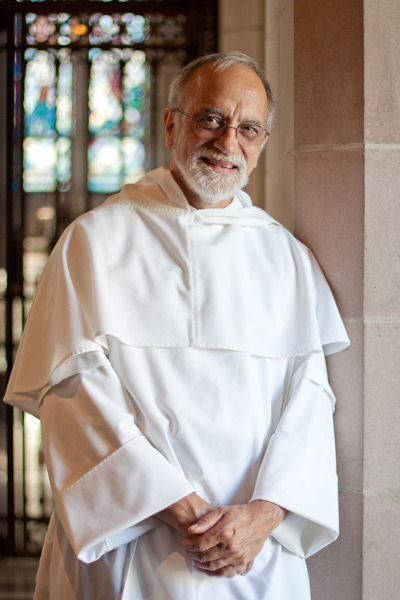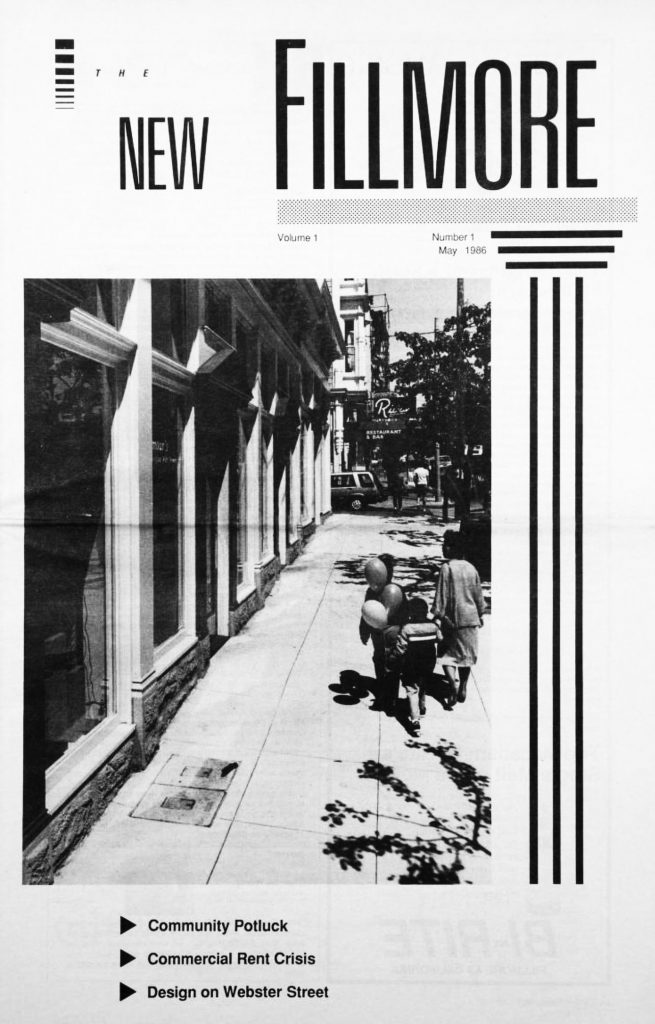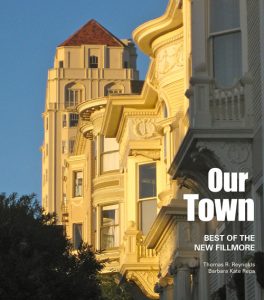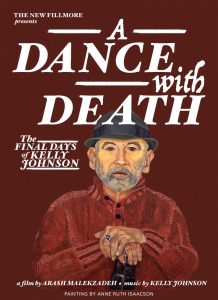
Photograph of Father Xavier Lavagetto by Kathi O’Leary
IT’S AN ICON in the neighborhood, with its Gothic arches, soaring tower and flying buttresses. St. Dominic’s Catholic Church has stood proudly at the corner of Steiner and Bush Streets since 1928, when the stone sanctuary replaced an earlier brick building destroyed by the 1906 earthquake.
For nearly two decades — an unusually long time by Dominican standards — Father Xavier Lavagetto has been a part of the parish, the last 13 years as pastor. But his service will come to an end the first week of July when the church — and the neighborhood — bid farewell to the man with the familiar easy smile dressed in flowing white robes with sandals sticking out the bottom.
Much of his tenure has been focused on repairing and restoring the church’s landmark home.
“The building — the building,” he sighs. “It has been my albatross.”
Soon after he became pastor in 1999, it became clear that major work would be required to stop the leaks that plagued the building.
“Arnold Constable was a great architect,” Father Xavier says, “but he knew nothing about putting a roof on a building.”
Then the mullions on the stained glass windows began to flake, the steel rods holding the finials to the tower were rusting away and water was puddling behind the elaborately carved wooden confessionals that line the sanctuary.
“It was one thing after another,” he says. “No one had a concept of how bad it was.”
Finally — “11 million plus bucks later,” he says — most of the major repairs are completed and paid for.
Despite the focus on material matters, Father Xavier is also widely credited with expanding the programs offered at St. Dominic’s, which have helped make it one of the few Catholic parishes — and one of the few churches of any kind — to continue to grow and remain vital.
“I swore to myself I wouldn’t let the building be the only thing,” he says. “We’ve had significant growth.”
Father Xavier is particularly proud of the faith formation programs the church has undertaken, especially a “strength finders” program with the Gallup organization and a “called and gifted” program aimed at young adults.
“How do you invite people to discover what’s best and deepest in them?” he asks. “If you only supply sacraments, that’s not enough. People want to make sense of their lives.”
To that end, he had hoped to expand the historic building that formerly housed St. Dominic’s School on the north side of the church into a major parish hall that would allow more programs for both the membership and the community. But the economic downturn forced the church leadership to trim its sails. Now the plan is to renovate the building, which was left empty when dwindling enrollment led St. Dominic’s School to move and merge with Mission Dolores School last year.
“I’d like to see this place be of real use to the community,” he says. “And I would love to get rid of those modular buildings” beside the school.
He says the immediate neighbors have mostly been understanding about the church’s homeless center and its programs to serve the needy left behind as the neighborhood has grown increasingly affluent.
It is the children who still clearly have his heart. Father Xavier spent 25 years as a Christian Brother before he entered the priesthood, mostly as a teacher. He was in Los Angeles for much of that time.
“I never quite warmed up to L.A.,” says the East Bay native. “But the kids! I confess sometimes I wish I was back in the classroom with chalk.”
Father Xavier and St. Dominic’s have been spared the trauma that has gripped the church over child abuse by priests elsewhere, but still felt its fallout.
“It’s been painful,” he says. “And the way it has been handled historically was even worse. It was very, very painful.”
He talks with a visitor in his office in front of an overflowing rolltop desk, books and photographs and memorabilia overflowing, his sandals propped up on an open drawer and his clerical collar unbuttoned.
Suddenly an alarm sounds.
“My habit is calling,” he says, running out the door to take his priestly robe out of the downstairs dryer. “I need it tonight for 5:30 mass.”
In a few minutes he’s back, uninclined to accept praise for his tenure at St. Dominic’s.
“I’ll wait on that one,” he says. “Given what could have been achieved, I sometimes feel like a failure.”
The conversation makes him think of his father, the legendary baseball player, coach and manager Cookie Lavagetto, whose double during the ninth inning of the 1947 World Series — known as “the Cookie Game” — was credited with giving his Brooklyn Dodgers an unexpected win over the New York Yankees. He was also the last manager of the hapless Washington Senators and the first manager, after the team moved, of the Minnesota Twins.
“Dad always said, ‘I wish I’d done better,’ ” he recalled.
Even as a boy in a baseball family, Father Xavier knew baseball wasn’t for him. And his father supported his decision to join the Christian Brothers after high school.
“Dad was the most religious man in the family,” he says.
After he leaves St. Dominic’s, Father Xavier will head to Hawaii to go diving with his brother and sister-in-law, both avid divers. He’s already logged more than 200 hours underwater and is looking forward to more.
Then he’ll get his wish to go back to school by joining the Catholic chaplaincy at Stanford University.
“How’re you gonna beat Stanford?” he practically crows. “Any campus would do — I’d be happy to go back to high school. But Stanford! I always say about teaching, ‘It’ll keep you young, it’ll keep you honest — and it’ll keep you learning.’ ”
Filed under: Body & Soul, Locals





